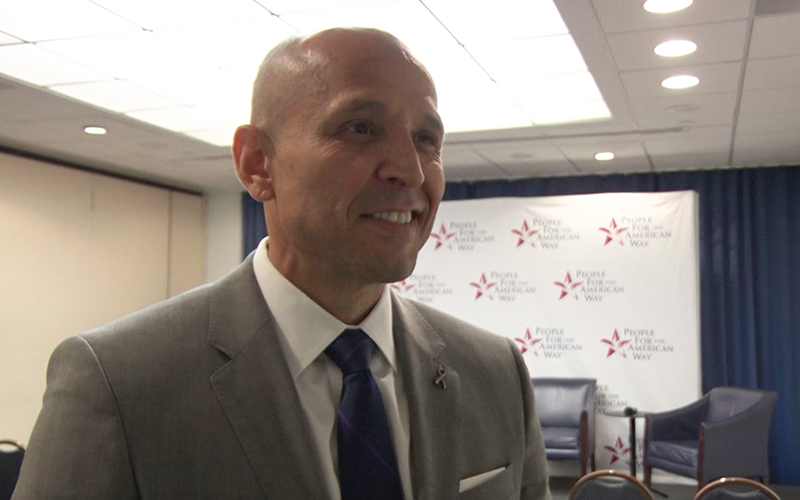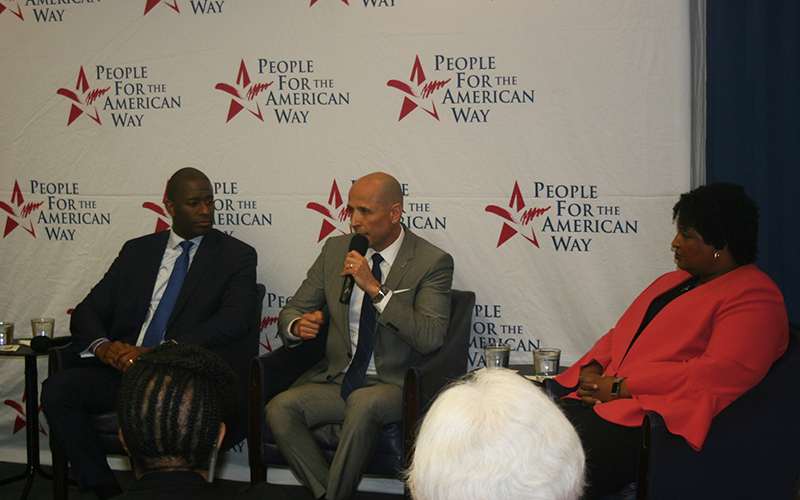
Democratic gubernatorial hopeful David Garcia said the party has been making steady gains in Arizona and he thinks this is the year, and he is the candidate, to turn the state blue despite trailing in registered voters and funds. (Photo by Shelby Lindsay/Cronkite News)

Arizona candidate David Garcia and fellow Democratic gubernatorial hopefuls Andrew Gillum of Florida, left, and Stacey Abrams of Georgia were endorsed for their progressive messages by People for the American Way. (Photo by Philip Athey/Cronkite News)
WASHINGTON – After years of incremental improvement, Democrats have a “great chance” of turning Arizona blue this year, gubernatorial candidate David Garcia said Wednesday.
Garcia was in Washington to receive an endorsement from the People for the American Way, along with Democratic gubernatorial candidates from Florida and Georgia.
He said Democrats have “been making progress every year” in Arizona and he thinks his message this year will increase turnout and give Democrats something to vote for, rather than just countering the Republican candidate.
“We’re seeing more energy and more activism at every local level than we’ve ever seen in Arizona,” said Garcia. “It’s something you can harness and it’s going to be the energy we use to ride to the top.”
Political experts and Republican Party officials in Arizona said they have heard similar claims from Democrats in the past and don’t see anything different this year.
“The Democrats are a lot of talk, but until they prove themselves with fundraising and voter registration it’s just talk,” said Torunn Sinclair, a spokeswoman for the Arizona Republican Party. “This has been an ongoing narrative for years.”
Others say there has been change, however.
Democrats made some gains in 2016, when Democrat Paul Penzone unseated longtime Maricopa County Sheriff Joe Arpaio, a Republican who held the seat for 20 years. President Donald Trump’s margin of victory was only 4 percent in a state that routinely delivered double-digit victories for Republican presidential candidates.
Republican political consultant Jason Rose acknowledged that the GOP does not hold as strong a position in the state as it has in the past.
“There is a lot of issues facing Republicans,” said Rose who thinks 2018 is “going to be the best Democratic year since 2006,” when Democrats nationally took control of both houses of Congress and the majority of governorships.
Rose said Republican Gov. Doug Ducey could be dogged by the controversial proposal to expand the state’s school voucher program, which will be on the ballot in November along with the governor’s race.
Garcia, an expert in education policy and professor at Arizona State University’s Fulton Teachers College, agrees that the voucher proposal will be a “huge issue in 2018.” He called education “our governors’ weakness.”
“It’s the area that he has been dismantling public education, vouchers being the last straw and I think you’re going to see a big change in Arizona,” said Garcia, who ran unsuccessfully for state superintendent of education in 2014.
But analysts said Garcia still has to overcome Democratic shortcomings in voter registration and campaign fundraising.
There were 1,262,989 registered Republicans in the state on Jan. 1 to 1,096,747 Democrats, an advantage Mike Noble, lead pollster with OH Predictive Insights, feels will be the deciding factor in any statewide race for now.
“I hear those guys say that but I look for facts, I look for data,” Noble said of Democratic predictions. “Unless I see a surge of new voters … I don’t buy it.”
Registration is not the only area where Garcia is lagging: He had just over $94,000 on hand compared to more than $2.6 million for Ducey, according to the latest filing with the Arizona Secretary of State’s office.
“Quite frankly, how do you pay a staff with that?” Sinclair asked.
Noble said a good way to determine momentum and support in a campaign is to look at fundraising and “look at his cash on hand versus Ducey’s … clearly there is a lot more support for Republicans than Democrats in this state.”
Rose agreed that despite all the potential challenges facing Republicans in November, the money deficit will be a large hurdle for Garcia to get over.
“Garcia’s problem is money,” Rose said. “He has some organizational problems he has to work through.”
Garcia said he isn’t worried about the money deficit.
“I’ve faced long odds for a long time,” he said. “We have more individual donors by double than Gov. Ducey does and it’s that power that’s going to get us over.”
Garcia also said his campaign has something that money can’t buy, the enthusiasm and energy of his supporters.
But at the end of the day, “money matters in politics,” Rose said.